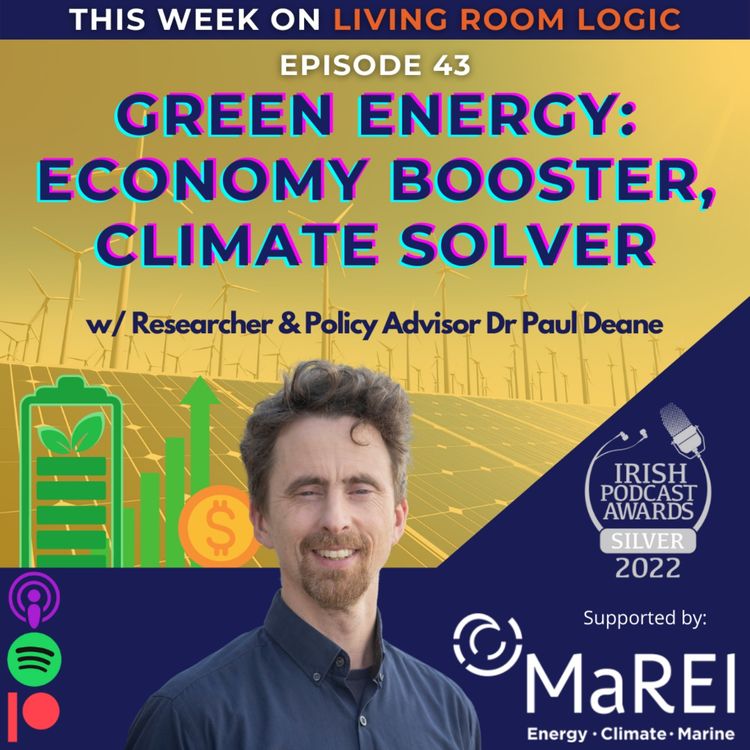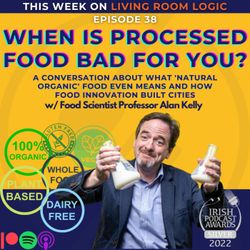Share

Living Room Logic – Irish Science Podcast
Green Energy: Economy Booster, Climate Solver w/ Researcher & Policy Advisor Dr Paul Deane
In today's episode of this award winning science podcast, Aidan interviews an expert in renewable energy, Dr Paul Deane, who explains why renewable energy could play a huge part globally in stabilising energy supplies, reducing costs and reducing carbon emissions massively. Paul has previously given TED talks about these issues and has won several awards for science communication, so he's definitely worth listening to, on top of his expert knowledge of his field.
This episode was supported by MaREI, the Science Foundation Ireland Research Centre for Energy, Climate and Marine, coordinated by the Environmental Research Institute (ERI) at University College Cork. To find out more about MaREI visit https://www.marei.ie/.
If you would to help keep the lights on, you can support us by joining our patreon, visit the link below to see the different patron options. Thank you!
More episodes
View all episodes

45. We WILL Stop Climate Change: Here's How
41:01||Ep. 45The world's most important climate conference to date, COP27, is on right now in Egypt. Why should I give a f**k!? You might ask. This is why: Humans have managed to increase Earth's temperature by 1.1 C since the late 1800s, and we're on a trajectory for 3 C warming by 2100, which would basically be Armageddon. But don't freak out just yet, 3 UN climate reports have come out in the last two years that give us CLEAR guidelines on what the world needs to do to stop the earth from warming past 1.5 degrees C and prevent catastrophe. In this bonus episode, Aidan (who just happens to be a climate change expert) breaks down everything we know about climate change and how to stop it using the UN 3 climate reports as a roadmap to victory.Sadly, this is Aidan's last episode as a co-host on Living Room Logic, which he explains at the end of the episode, prepare to cry. Tears aside, Aidan is moving on to greener pastures, and will keep the LRL memories close to his heart for many years to come!The patrons of this podcast keep the pod alive, and we are so grateful to them! If you 'd like to help us out, consider joining our patreon below! There's a few exclusive gifts you get as a reward as well!
44. How to Care About Climate Change (& Why You Should) w/ Researcher & Activist Dr Clare Watson
43:11||Season 4, Ep. 44In today's episode of this award winning science podcast, Aidan interviews a social scientist and climate activist, Dr Clare Watson, who tells us why many people deny or ignore climate change, and how positivity and community engagement (with a little help from the government) can refresh people's mindsets towards less doom and gloom and more action and progress.This episode was supported by MaREI, the Science Foundation Ireland Research Centre for Energy, Climate and Marine, coordinated by the Environmental Research Institute (ERI) at University College Cork. To find out more about MaREI visit https://www.marei.ie/.If you would to help keep the lights on, you can support us by joining our patreon, visit the link below to see the different patron options. Thank you!
42. The Power of Offshore Wind w/ Lecturer & Engineer Dr Frances Judge
42:27||Season 4, Ep. 42In today's episode of this award winning science podcast, Aidan interviews an offshore wind energy expert Dr Frances Judge, to find out just how big offshore wind is getting, how to build Eiffel Tower sized structures in raging seas, and why offshore wind may be one of the worlds ways to curb rising energy costs and fight climate change.This episode was supported by MaREI, the Science Foundation Ireland Research Centre for Energy, Climate and Marine, coordinated by the Environmental Research Institute (ERI) at University College Cork. To find out more about MaREI visit https://www.marei.ie/.If you would to help keep the lights on, you can support us by joining our patreon, visit the link below to see the different patron options. Thank you!
41. Do men feel more pain than women? w/ Dr Siobhain O'Mahony
27:27||Season 4, Ep. 41What is more painful, a kick in the jewels or giving birth? Who REALLY experiences more pain: men or women? On today’s show, we sit down with Dr Siobhain O’ Mahony, a senior lecturer at University College Cork specializing in pain neuroscience, women's health, and the gut-brain axis. Dr. Siobhain starts the conversation by defining pain syndromes, different types of pains for both genders, and sex differences in how we perceive pain. She also expounds on the relationship between pain and estrogen level fluctuations, why high estrogen levels cause pain resistance, as well as how it’s entangled with birth control methods. Finally, we explore her research on the role of gut microbiota on anti-inflammatory & anti-pain properties, brain-gut microbiota axis, and healthy dietary changes or supplements that can target pain disorders such as probiotic intake. Here’s a glimpse of what you’ll learn: ● [01:09] Defining “pain syndrome/condition” ● [02:27] Different types of pains ● [04:29] Sex differences in how we perceive pain ● [06:39] The science behind estrogen levels & pain ● [11:36] Pain interaction with contraceptives ● [13:55] Dr. Siobhain’s investigative research on gut microbiota ● [19:59] Dietary changes to target pain disorders ● [23:07] Sex difference pain in irritable bowel syndrome Key Quotes by Professor Dr. Siobhain O’Mahony:● It’s not the levels of estrogen that are important with regard to sexes & sex differences in pain. It’s the fluctuation levels that we have.● Maintaining a healthy gut microorganism environment is really key to well-being.● Women have a lower threshold & lower tolerance to pain stimulation than men.
40. How an Irish Mathematician is Uncovering LIFE in the Universe at NASA w/ Dr Caoimhe Rooney
41:58||Season 4, Ep. 40Today, we sit down with Dr. Caoimhe Rooney, a research scientist at NASA whose areas of expertise include mathematical modelling of complex engineering systems, planetary science, public communication and mission design. She has been featured in Forbes 30 Under 30 in 2022. Listen in as Dr. Rooney discusses how participating in Oxford’s Industrially Focused Mathematical Modelling program paved the way for a career in applied mathematics at NASA. She speaks on the delicate balance between performing technical analysis and accepting uncertainty in the field of exoplanet characterisation. Dr. Rooney also talks about the goals of mathematical modelling at NASA and how she typically goes about collecting and applying data in her work. She shares her uniquely challenging experience as the only mathematician on a team of physicists, alongside having to navigate a considerable time difference. Finally, Dr. Rooney speaks on her future goals as well as her initiative to get more women into the field of mathematics via the Mathematigals platform. Here’s a glimpse of what you’ll learn: ● [02:43] Why Dr. Rooney chose space ● [07:42] About Dr. Rooney’s PhD thesis ● [12:50] Applying mathematical modelling to planetary science ● [17:10] Factoring clouds into mathematical models ● [21:52] The goals of mathematical modelling at NASA ● [27:50] How Dr. Rooney collects data ● [31:11] Being the only mathematician on a team of physicists ● [34:57] About Mathematigals ● [38:46] Dr. Rooney’s goals for the future of her career Key Quotes by Dr. Caoimhe Rooney:● Something that you might not be able to physically touch or put your hands on will still be underpinned by some sort of mathematical equation. There is always a way that you can take something physical and put it on paper in the form of equations and physics principles.
39. How Women can OPTIMISE Training to their Bodies w/ Sports Scientist David Nolan
55:48||Season 4, Ep. 39Does the menstrual cycle impact performance? What about the contraceptive pill? How does a history of research in men, impact how we advise women to exercise? This week Andrew speaks to David Nolan, a fantastic PhD candidate in applied sports sciences under the supervision of Dr. Brendan Egan at Dublin City University.David is an experienced sports science practitioner and academic. Currently an assistant lecturer in physical activity and health science at the Technological University of the Shannon and Program Lead on the MSc. in Sports Performance Analysis at the Portobello Institute. Founder of Synapse Performance which aims to educate in the areas of health, nutrition, and human performance through interactive seminars/workshops and media content production, and offer corporate consulting services to enterprises in the sports science and technology sector. Host of the Synapse Performance Podcast which is a collection of interviews with leading experts and researchers in the area of strength and conditioning / human performance.
38. When is processed food BAD for you? w/Prof Alan Kelly
39:31||Season 4, Ep. 38Today, we sit down with Alan Kelly, a professor in the School of Food and Nutritional Sciences at University College Cork. Listen in as Professor Alan deep dive into the various myths and misconceptions around processed food. Defining “processing” as the transformation of raw material, he sheds some light on what is actually done to food before it reaches consumers and how we can make more informed choices about what we put into our body. He kicks off the conversation with a brief history of processed food and how various preservation techniques have helped human beings to survive harsh climates and even allowed civilization to make the transition from farms to cities. Professor Alan goes on to make the case that many—even modern—food processing techniques do not necessarily make what we’re eating “unhealthy”. He speaks on the achievement of minimal processing in particular and how current and future technologies are geared towards finding better ways to keep our food safe and stable. Here’s a glimpse of what you’ll learn: ● [01:44] Defining “processed food” ● [05:46] Why processed food allowed civilization to evolve ● [10:14] The development of preservation techniques for the purpose of survival ● [13:17] How to look at processing techniques in the modern world ● [16:06] The regulation of food ● [18:42] Achieving “minimal processing” ● [25:48] The pros of preserving food ● [30:00] Social perceptions of food processing techniques ● [35:45] Future food processing technologies Key Quotes by Professor Alan Kelly:● Over thousands of years, we figured out that, to be good for us to eat, to be safe, to be stable, food has to be transformed one way or another.● Learning how to process food was key to the evolution of cities.● We need to have confidence that food is one of the most regulated parts of our daily lives.● Science, food science being no exception, is about solving problems.
37. Stress: Why some suffer and others COPE w/ Dr Samantha Dockray
33:37||Season 4, Ep. 37What makes one persons bad day, another persons trauma? This week we go through the extraordinarily complex concepts which are as complex as any individual but Dr Samantha Dockray breaks it down. Dr. Samantha Dockray is a Senior Lecturer in the School of Applied Psychology, University College Cork. Her key interests relate to the application of psychobiological models of behaviour and emotions, including diatheses-stress frameworks to understand adolescent health and development. Samantha has a particular interest in how puberty contributes to health, as well as in stress and allostatic load in adolescents. Samantha's research and other activities are described at beats-lab.com.